
Mary Wanjiku, 26, displays one of her beaded products next to her shop in Limuru, a town in central Kenya. Wanjiku is a beneficiary of the Limuru Cheshire Home, a charitable institution for girls living with physical and intellectual disabilities in Kenya. The home is run by the Assumption Sisters of Nairobi. (Wycliff Oundo)
Along a busy junction in this cold central Kenyan town, a tiny blue metallic booth struggles to stand out, obscured by shops and passenger service vehicles. Inside is 26-year-old Mary Wanjiku, a graduate of Limuru Cheshire Home. She proudly displays her collection of beaded napkin holders, bracelets and necklaces that she sells to passersby and the community.
"Disability is not inability," Wanjiku says, gesturing to her shop christened Beads and Arts Center.
Her self-empowerment journey began six years ago when a group of good Samaritans rescued her from the streets of her hometown in Kabuku, a village in central Kenya, and sought her admission at the Limuru Cheshire Home, a charitable center for girls living with physical and intellectual disabilities.
The center that is managed by the nuns from the Assumption Sisters of Nairobi was started almost 50 years ago by a World War II veteran, Geoffrey Leonard Cheshire. The center is among the four facilities under the Cheshire Disability Services Kenya, a nongovernmental organization in Kenya that "focuses on the rehabilitation of children and youths with disabilities through corrective surgeries, different kinds of therapies and provision of various assistive devices," according to the institution's mission statement.
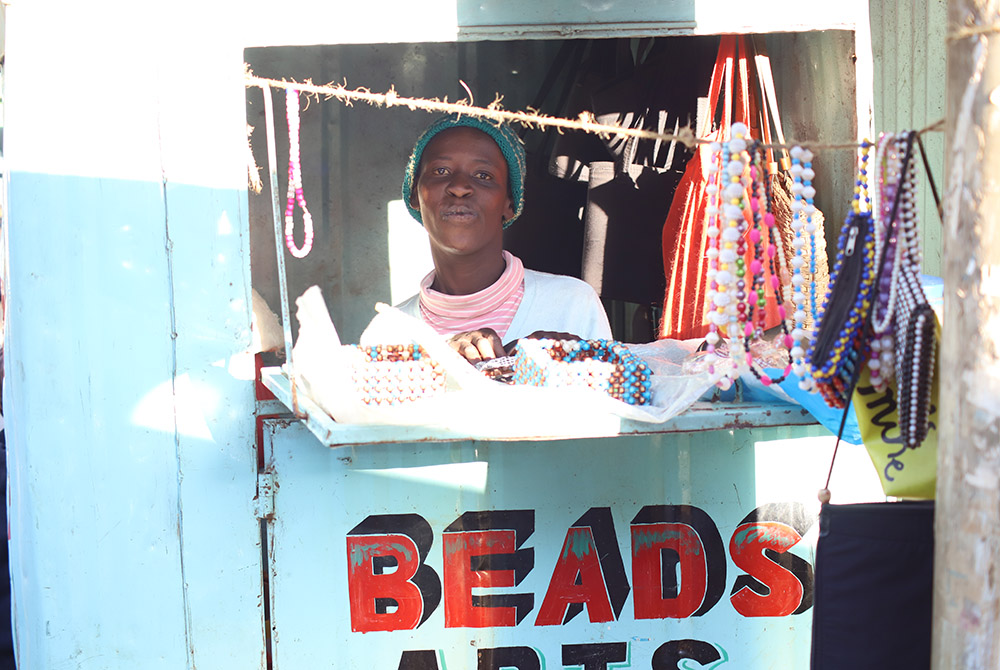
Mary Wanjiku, 26, is pictured inside her beadwork shop along a busy junction in Limuru, a town in central Kenya. Wanjiku, who lives with cerebral palsy, graduated from Limuru Cheshire Home, and the Assumption Sisters of Nairobi helped bootstrap her business while the community constructed and installed her shop. (Wycliff Oundo)
Limuru Cheshire Home offers shelter to girls living with disabilities and teaches them skills to meet their potential.
For the last three years, Sr. Rose Catherine Wakibiru has managed the center with the help of other sisters. However, in early November, she handed over responsibilities to Sr. Consolata Banda, who was working with her.
Wanjiku, who lives with cerebral palsy — a group of disorders that affect a person's ability to move and maintain balance and posture — said she was a misfit, people at her hometown ignored her, and she felt like she was an agony to her already poor family. "Before the good Samaritan took an interest in me, it felt like I was alone; aside from my family, no one else spoke to me. It was like they were afraid of me," she remembered.
Wakibiru agreed, noting that, "some of the girls we admit have faced discrimination, abuse and trauma."
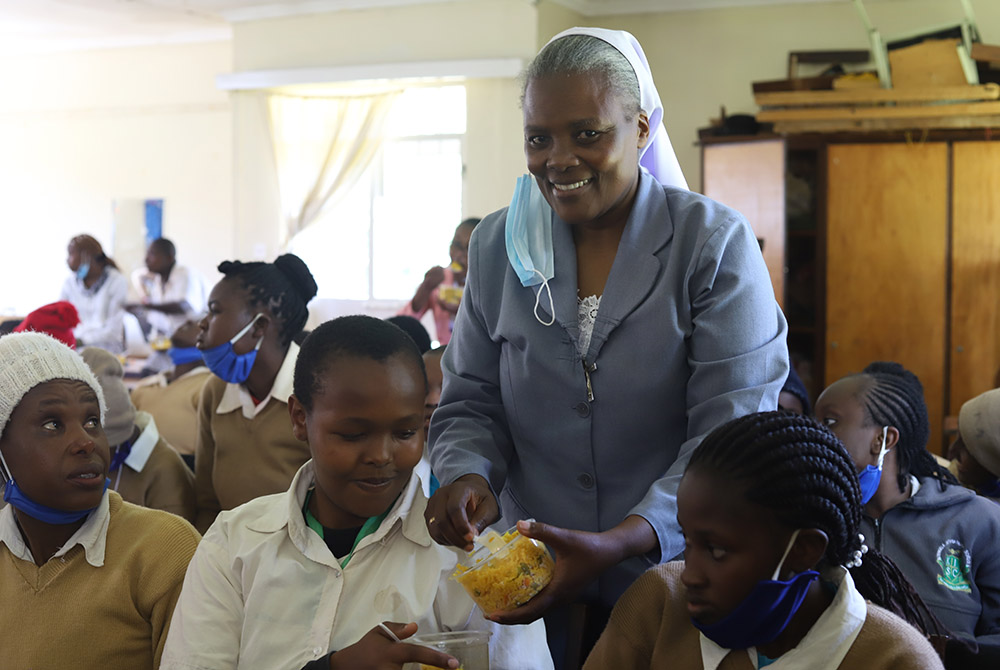
Sr. Rose Catherine Wakibiru of the Assumption Sisters of Nairobi distributes food to girls at Limuru Cheshire Home, a charitable institution for girls living with physical and intellectual disabilities in Kenya. Wakibiru has been the home's administrator for the last three years and is handing over the mantle to Sr. Consolata Banda of the Assumption Sisters of Nairobi. (Wycliff Oundo)
While at the center, Wanjiku gained skills in beadwork, where she graduated in 2019. The sisters gave her $90 to start a business while the community pitched in and constructed a booth for her, she said, adding that her handmade beads range from $2 to $9.
"I was excited to leave the center with this beadwork skill," said a cheerful Wanjiku, noting that she was also taught how to cook and farm by the sisters. "The sisters really changed my life. I will never forget them."
Wanjiku is among thousands of women in Kenya living with disabilities who have been assisted by the Assumption Sisters of Nairobi at the center through training in tailoring, farming, bakery and computer skills to exploit their potentials for sustainable livelihoods.
The East African nation of nearly 54 million people has 918,270 Kenyans living with some form of disability, according to the 2019 census report released by the Kenya National Bureau of Statistics. The census report indicates that more women are living with disabilities compared with men. The population of women with disabilities is 523,883 compared with 394,330 men
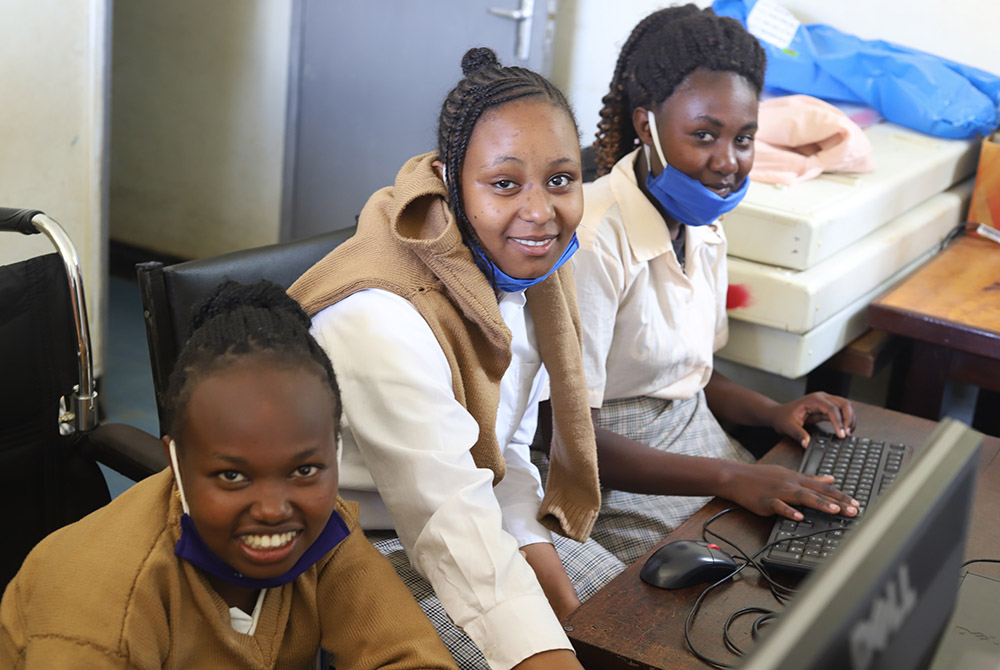
Girls from the computer literacy class showcase their skills in a computer room at Limuru Cheshire Home, a charitable institution for girls living with physical and intellectual disabilities in Kenya. (Wycliff Oundo)
In Kenya, people with disabilities face stigma, especially when the community or family attributes their disability to a curse. The majority of the communities still believe that children born with disabilities result from punishment for their parents' sins, particularly the mother. In such cases, they are considered a shame to the family, and as a result, they are rejected by the family or the community, forcing them to the streets.
Wakibiru said the home was established to take care of the women and girls living with disabilities that were facing stigma and wandering on the streets because of rejection from their parents or society. The center now hosts more than 60 girls with varying disabilities, including mental disorders and physical disabilities. It is also an educational center accredited by Kenya's ministry of education.
"The center has rescued thousands of girls and women since it was started," she said. "We have given them skills to survive. Some have started their own businesses while others are currently employed."
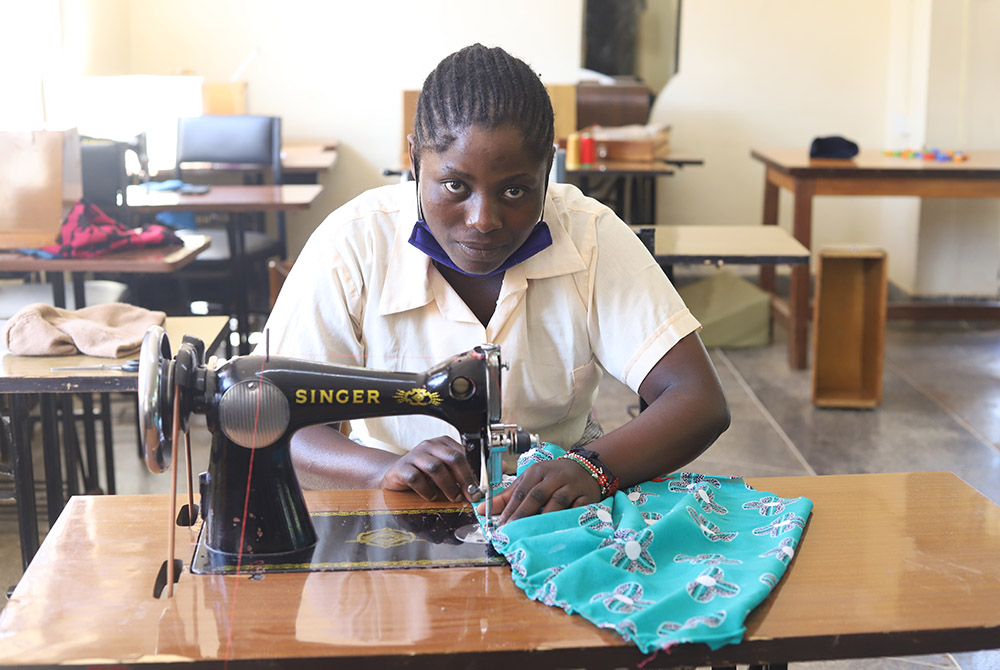
Gladys Phanis Makanga, 21, operates a sewing machine in Limuru Cheshire Home, a center for girls living with disabilities in central Kenya. Makanga has completed her four-year training at the center and waits to graduate with skills in tailoring and beading. (Wycliff Oundo)
Gladys Makanga, who joined the center in 2018 and is waiting for her graduation in December, is an example of the social rejection. Before her admission at the center, she faced stigma from other students at the school she was attending in Nairobi's outskirts, she said, noting that the sisters encouraged and gave her hope to pursue her dreams at the center.
"Life was hard at home and school. Everyone laughed at me, and I felt so bad," said the 21-year-old, who has majored in tailoring at the center.
Like many other girls there, Makanga dreams of helping her family and being self-empowered when she finally graduates.
"My family is very proud of me now that I am graduating. I hope to start a shop so that I can provide for my siblings and family," said Makanga, who also has a physically disabled brother and seven other siblings.
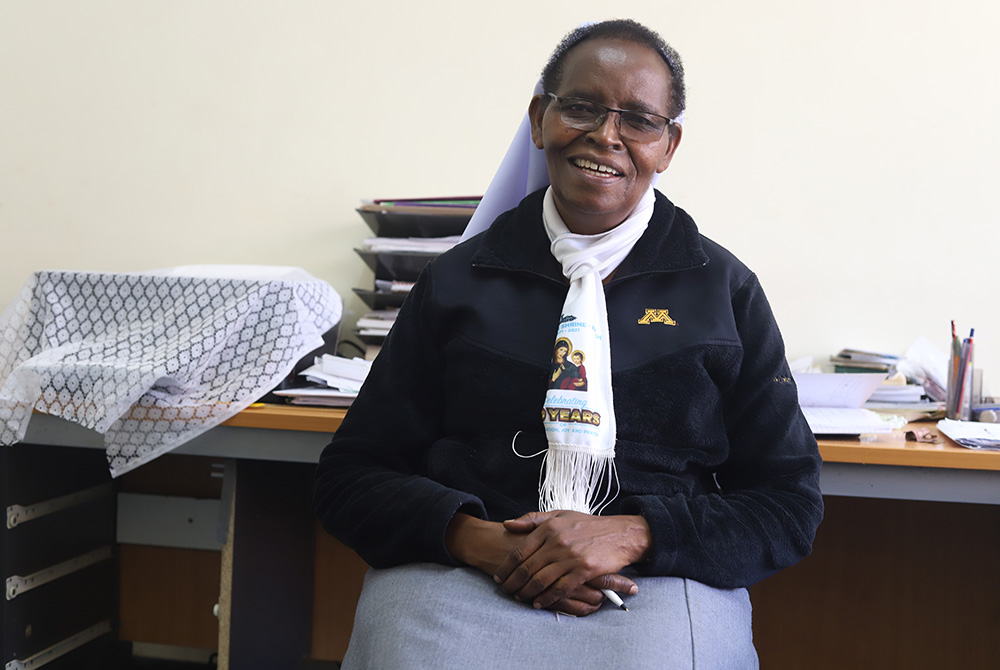
Sr. Consolata Banda of the Assumption Sisters of Nairobi is the new administrator of Limuru Cheshire Home, a charitable institution for girls living with physical and intellectual disabilities in central Kenya. Taking over the top post from Sr. Rose Catherine Wakibiru, she will be responsible for providing care to more than 60 girls living with disabilities. (Wycliff Oundo)
Banda, the center's incoming administrator, said she hopes to admit more girls and prioritize gradual change of the center's admission process to be more systematic through vetting applications based on how much value the facility can provide to a girl's life. She attributes the decision to a lack of specialized staff that disabilities such as visual and auditory defects may need.
"Some children need specialized care from professionals. Here we can only offer them general care and skills because we are not professionals. Therefore, we need to prioritize cases of children that we can impact based on what we have," said Banda.
However, Wakibiru said the center faces many financial challenges. Meeting demand for admissions to an overstretched facility is a significant challenge for the sisters, she said.
To supplement the aid from the community, companies fulfilling their corporate social responsibility, and from international donors, the sisters have turned to entrepreneurship.
Advertisement
"We have invested in initiatives such as a bread bakery where we sell leftover bread to our partner schools," she said. "We also have a mushroom farm that supplements the girls' diet, and we sell the excess produce to the community. There is a greenhouse, where capsicums [bell peppers] and tomatoes are grown, and a shed with five cows and a few chickens that the girls help us in rearing."
After the girls have graduated, the sisters keep in touch with them and their families. "We check up on girls during holidays and even after they have left the center to pursue their dreams," said Wakibiru. "It's crucial to continue being their mentors and support them with capital to aid their financial independence and share their success stories with other girls who are still at the center."
Meanwhile, Wanjiku understands that thousands of women and girls living with disabilities are still wandering on the streets, and they have no one to help them. She is appealing to donors to intervene so that they can rescue others and help them to achieve their potential.
"I hope others can also get assistance from well-wishers so that they can be self-reliant and prove disability is not inability," she said.
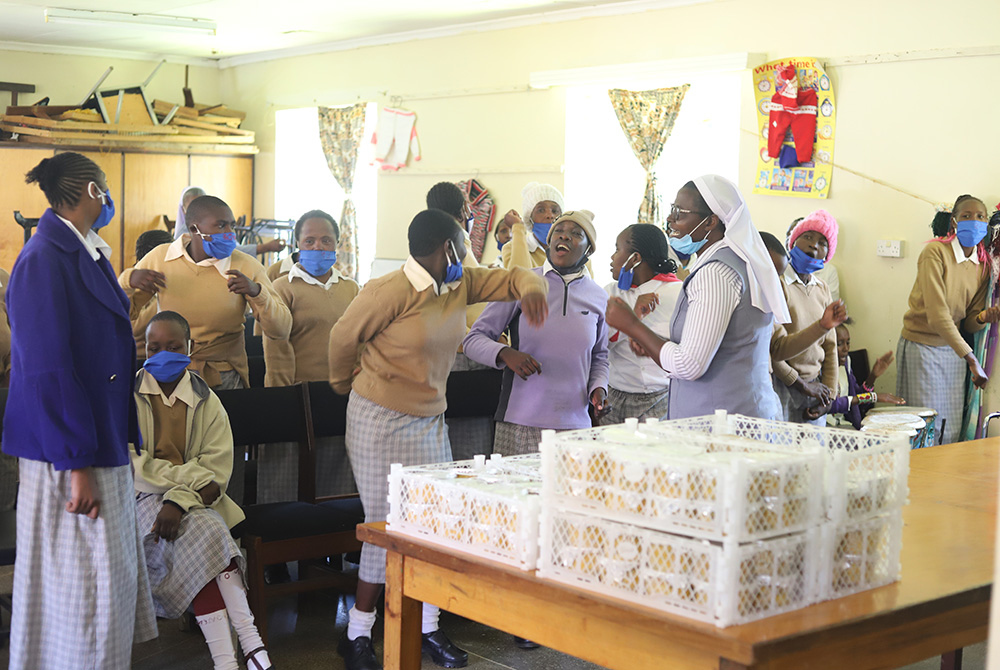
Sr. Beatrice Kaari of the Assumption Sisters of Nairobi leads girls at Limuru Cheshire Home in song and dance that encourages confidence and a sense of belonging to the girls. Kaari works with other sisters at the home to provide care to more than 60 girls living with disabilities. (Wycliff Oundo)







